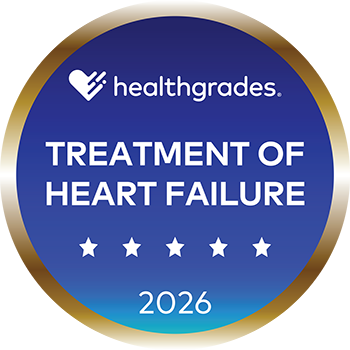What is Heart Failure?
Heart failure happens when your heart can’t pump enough blood to meet your body’s needs. It's a condition that develops over time. It can be caused by:
- Cardiomyopathy (heart muscle disease)
- Congenital heart defects (present at birth)
- Coronary artery disease
- Diabetes
- Heart valve disease
- High blood pressure
It causes shortness of breath and tiredness and leads to fluid buildup throughout your body, including your arms and lower body.
A Team Approach
Our cardiologists, nurses, nutritionists, pharmacists, cardiac rehab specialists, and medical social workers work as a team to give you complete care and personal attention to relieve symptoms. We offer expert treatment, education, and guidance to help you live better and feel your best.
We also help you coordinate the services you need — from arranging appointments with specialists to connecting you with therapies and programs that can help.

Healthgrades 2026 - Heart Failure
Nonsurgical Heart Failure Treatment
We use regular checkups and a variety of approaches to help you reduce or prevent symptoms and stay healthy, including:
- Cardiac rehabilitation. We combine education, exercise, and encouragement to help you feel better and get healthy.
- Fluid intake. To help prevent fluid retention, a common heart failure symptom, we make sure you know how much and what to drink.
- Lifestyle changes. Heart-healthy living — such as eating right, exercising, and avoiding smoking — can help minimize symptoms. Our nurses and nutritionists provide you with information and guidance to take control of your health.
- Heart monitoring. We use implantable heart devices — such as implantable loop recorders — to keep track of your heart function and alert us about changes.
- Medicines. Medications can lower blood pressure, prevent fluid buildup, and help your heart work more efficiently.
Heart Failure Procedures and Surgery
If lifestyle changes and medicines don’t relieve symptoms, your doctor may recommend an advanced treatment to help you feel better. We use a variety of approaches to treat the causes of heart failure, including:
- Arrhythmia treatments. We use various methods to correct arrhythmias that put extra strain on your heart — from minimally invasive cardiac ablation to implantable heart devices and Maze surgery.
- Biventricular pacemaker. This implantable device, placed under the skin on your chest, sends electrical signals to your heart to help it pump more blood through your heart.
- Percutaneous left ventricular assist device (L-VAD). This battery-operated device, used to treat end-stage heart failure, helps the heart pump blood. It’s implanted in your abdomen or chest and attached to your heart.
- Coronary artery bypass graft (CABG) surgery. We use minimally invasive, robotic-assisted, and open-heart surgery procedures to restore blood flow to the heart — including a less invasive hybrid revascularization procedure to treat multiple blocked arteries.
- Heart valve repair or replacement. We perform minimally invasive interventional procedures, like mitral valve repair and transcatheter aortic valve replacement (TAVR) and surgery to fix faulty heart valves.
- Extracorporeal membrane oxygenation (ECMO). ECMO uses a heart-lung machine to take over your heart and lung function when they no longer work. It's a temporary option to give your heart and lungs time to heal.
